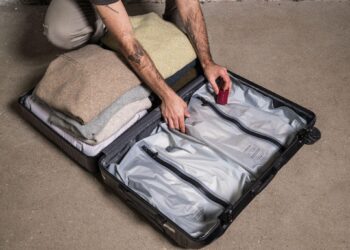Every fifth person believes that business travellers hurt his psychological state, productivity and relationships; it should be from a recent survey from the sleep shop’s analysis. Sleep is a significant component of wellness – here are ways to improve your sleep on business trips.
Stick to your usual schedule on short trips, two-day rule sounds simple: if you are away for no more than two days, stick to your simple plan. It usually takes just a couple of days for the body to adjust to changes in regimen. If the business trip lasts less, the adaptation will not be completed in time, and after returning home, it will start over.
It may be better to arrange your appointments to fit your usual schedule rather than trying to adjust to local times. Keeping a home schedule will help you get better rest on short trips.
1. Bring your sleeping supplies.
Make a list of the things you need for a relaxing night out. If a mask for sleeping, white noise recordings or sound waves helps you at home, take them with you. Treat sleeping on the road the same way as sleeping at home.
You can also store natural sleep aids like melatonin and magnesium in your bag to help relax your body and mind. Melatonin regulates the sleep cycle and enables you to fall asleep. Magnesium synthesizes proteins, helps muscles contract and relax, and maintains and regulates blood sugar levels.
2. Make up pleasant rituals and turn off gadgets.
Many busy executives are accustomed to sitting at a laptop until the last, but if you put away your gadgets an hour before bed, you can get rid of travel insomnia. This applies not only to laptops and smartphones, but also to TVs: the blue light that their screens emit has the same effect. Read a paper book or newspaper before bed, write in a diary, take a relaxing bath, or just sit by the window.
Meditation is another exercise that can help calm the body and mind. The Bulletproof team has a bedtime meditation audio guide that’s beginner-friendly and travel-friendly. There are a few other good meditation apps out there, including Headspace and Calm. But, as noted above, using a Smartphone before bed can disrupt the sleep cycle or push you to scroll through the Instagram feed.
3. Plan your sleep
Get at least eight hours of sleep before your trip – this is very important to get you started on the right track. If you’re on a business trip feeling over-energized and having trouble sleeping, remember to take melatonin or magnesium, which can improve your night’s rest without the side effects of sleeping pills.
4. Do not overdo coffee
Under normal conditions, coffee and caffeinated beverages can help prevent afternoon drowsiness, but reduce their consumption on a business trip. Try limiting yourself to one or two cups a day and try not to drink coffee in the late afternoon. To get a good night’s sleep, it’s best to take your last coffee break no later than three in the afternoon.
5. Go in for sports
Physical activity greatly affects the state of the body, including improving the quality of sleep. During your trip, go to the hotel gym or just take a walk. You will feel the positive effects of this when you go to bed.
6. Avoid alcohol, nicotine and spicy foods
Large amounts of alcohol, cocaine and spicy foods lead to sleep disturbances. This does not mean that you should completely eliminate them, but try to reduce the dose of these substances as much as possible.
7. Don’t eat and drink a lot before bed.
You need to sleep at night in order for your body to rest, so make sure that it has time to digest everything you ate and drink during the night. Otherwise, you will wake up tired and feel heartburn.
But remember that going to bed on an empty stomach is also harmful.
8. Examine your sleep chronotype
Contrary to the popular myth, waking up early does not make you a more successful person. If you simulate sleep (even while travelling) according to your body’s natural circadian rhythm, then you sleep better by default.







